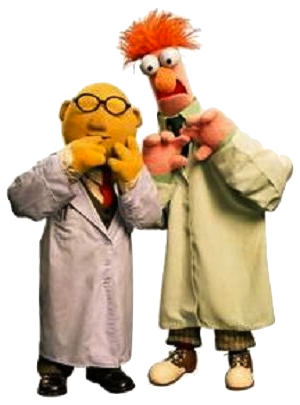Common misconceptions
The layman's view of physics is usually far from reality.
In fact, the layman's view of reality is often far from reality:
Physics is the study of the fundamental properties
of the Universe; but the average person understands little physics,
at least not in the way a physicist does.
Thus, most people have little understanding of the world they live in,
except for things limited to humankind, which tends to have a
small influence on the Universe as a whole.
Of course, if people understood themselves better, the world would
be a nicer place to live, but that's another story.
This story is about the impressions many people have about physics, and how they differ from the real thing. (See also Are you a quack?) In particular, it is also about high energy physics, the most fundamental part of physics, and the misconceptions of it held even by many students of physics.
Science
Physics is a science. Most misconceptions about physics are about science (& often technology) in general, but these are most obvious in the case of physics, because of all the sciences it is the most foreign to most people, because it seems to relate the least to everyday events. In fact, the opposite is true, since physics applies to everything, while the other sciences are more specialized. (See science and theoretical high energy physics.) The truth is that science is...- Reality
- Science is quantitative. Qualitative understandings are nice, but in science you need numbers: when, where, how much. That means you need math.
- Science is predictive. What matters most in science is not how you explain something, but how accurately you can forecast the outcome of an experiment. (E.g., "God did it" has no predictive power because "The Lord moves in mysterious ways," and thus is not an explanation, but only a consolation.)
- Science requires facts. In that way science is like law: You need proof (logical or mathematical) or evidence (experimental). Hearsay doesn't count. Ultimately it is the real world that determines the worth of a theory, not human tastes or habits or superstitions or morality.
- Science is understanding. Of course, such things as morals and personal preferences and culture determine how you use a theory, but that is technology, not science. Nature is sometimes unavoidably cruel or distasteful (science); only people can choose not to be.
- Imagination
- Science includes concepts that have no description in common terms. Many of the fundamental ideas in science are those that must be explained in ways totally unrelated to everyday experience, even though they are sometimes simple. Pictures alone won't do. "Common sense" doesn't always apply. That means you must be open-minded, and willing to accept concepts that might be unappealing or counter-intuitive, simply because the real world has proven them to be true.
- Science is not memorization. Winning a spelling bee or a TV game show is useless in the real world: Anybody can look up a word in a dictionary, or a date in a history book, or an equation in a math book, or a formula in a chemistry book. Memorizing the solution to every problem in every textbook gives you experience, but doesn't necessarily mean you understand the subject. Science is seeing the pattern, so you can solve problems you haven't seen before.
- Science requires originality. Most people don't find their own answers to problems in life; they just copy what others do. In school, this is called "cheating". Important scientific results require new ideas, not just new applications of old ideas.
- Science means asking questions. If you sit through a science class just listening, watching, & taking notes, you're in the wrong class. Science is all about asking questions. If you can't do that, better to find a different subject.

- Work
- Science is not a spectator sport. You will never learn real science by watching TV, browsing the Web, or reading popularized accounts. You need to work through a textbook or take a course. If that sounds like too much work, you are looking for entertainment, not knowledge.
- Science is hard. There is no such thing as "Science Made Easy". A deep understanding of the real world is not something you can learn while standing on one foot. Some things can be learned only with strong motivation and patience.
- Science is fun. How can work be fun? If your work isn't fun, you have the wrong job. (Oh, well, you can always find a nice hobby.) Scientists don't work hard because they're workaholics, but because they enjoy it; even if it weren't their job, they would do it as a hobby. You can only be good at something if you like it; necessity isn't enough motivation.
job
- For everyone
- Anyone can be a scientist (if they really want to). You may see a scientist on TV and think, "Wow, that guy must be a real genius. I could never do that." On the other hand, when you see somebody win the lottery, you might say, "That was easy. I have to try it." There are, in fact, a lot of bright scientists you never hear from because all their brilliant ideas turned out to be wrong. (OK, not as many as lottery losers.) On the other hand, Nils Gustaf Dalén won a Nobel Physics Prize for automatic coastal lighting. (I guess it was a slow year.) Most of science is luck and hard work. We can always use more scientists (but also more money to pay them).
- Science is not your enemy. Science includes many difficult topics. Don't take it personally. Just because you find some subject in science very hard doesn't mean you are stupid, or that scientists purposely made it that way just to get you. A challenge is not an insult.
- Science is not ethnic.
Whose idea was it that sports figures are "heroes" and others in entertainment are "stars", while those who work hard for an education are not? (Hint: Slaves and minorities were considered unthreatening as long as their activities were restricted to those that required no education.) Cultural repression is due as much to its victims as to the oppressors.
insignificance of man
- Science is not sexist. If you think ignorance is socially acceptable, then you have the wrong friends. Getting A's in school is not bad, & stereotyping of academic achievers based on genetics, culture, or life style is a problem of the bigot, not their victims. Unfortunately, some scientists may fall prey to the same prejudices, but compared to science itself, dealing with such people should be relatively easy.
- Science is "cool". Remember when computers were only for "nerds"? Now everybody has one. But not everyone is a computer scientist. The same can be true for the rest of science.
- Science is attainable. If illiteracy can be stamped out, so can ignorance of science. Children who ask "too many questions" can be encouraged to find their own answers.
- Science is the only universal education. The humanities are only about people. Technology is only about things people use. But people form only an infinitesimal fraction of the universe. Science is about everything.
- Indispensable
- Isn't spending that money on feeding starving children more important? Money is money: Why that money? Of all the other things in the world on which comparable amounts of money are spent, is science really @ the bottom in importance? For example, there is already enough food in the world to feed everyone: Is it really important for the people in the world who are better off to make themselves obese to the point of illness just to spite those who are starving? And is it really important for every person who can afford their own private car to have one? Is it even more important to go see a science fiction movie than support research into the science it is based on? Finally, do you really expect the kind of people who do find these things more important are the kind of people who would take money not given to science & give it to starving children instead? (Hint: What percentage of the politicians who favor cuts in funding for scientific research also favor an increase in funding for social services?)
- Man does not live by bread alone. (OK, considering the source, I'm using this one a bit ironically.) Who needs fire or the wheel anyway? Wouldn't people be just as well off if America were never discovered (even by the Indians)? OK, so you admit you need 20th-century science, but not 21st? Do you really think people will feel that way in the 22nd century? Nostalgia is not a good excuse for stagnation.
Scientists

Physicists or
pharmacists?
- Not all scientists wear labcoats. As far as I know, only some chemists and biologists do, to keep from spilling things on themselves. Physicists generally don't have anything to spill. Theorists don't work in labs. In fact, most scientists don't even wear suits anymore; nowadays that's mostly for businessmen. (An amusing aside: One day I was watching a movie version of "1984", where everyone in the "future" wore the same uniform. Then I watched an old movie, and all the men wore business suits. Which is scarier?)
- Scientists are just ordinary people, only better trained in science. Among scientists I have met geniuses and idiots, workaholics and sloths, winners and losers, introverts and extroverts, and none of these seem to be correlated. Of course, science is hard, so all scientists are strongly motivated, or else they don't last long.
- Some people find scientists intimidating, because they find science intimidating. Don't confuse the messenger with the message. If you think science is hard to learn, you should try to teach it sometime.
Ages of a Physicist
Not only does a physicist's view of physics differ from that of a layman, but a physicist's view changes as (s)he develops, usually at the cost of surprise and confusion. Here is an outline of the different stages in this development:| Theory | Experiment | Math | |
|---|---|---|---|
| High school | A very rationalist view of science: Addition of apples is just like the natural numbers, and measuring distances is just like Euclidean geometry. It looks like Descartes was right, and you can find the laws of nature just by pure thought. Science fiction seems plausible. | Just confirmation. | Still seems relatively simple. Generally involves things you can see in everyday life, if you bother to look. |
| College | Laws of nature seem less intuitive: Special relativity and quantum mechanics are surprising, and contradictory to previous learning. But it still seems that results can be derived rigorously from a precise set of axioms. Popular science still looks attractive. | Unavoidable, and necessary as a resource. | Math now passes calculus, and seems more distant from physics, although applied math is still useful. |
| Research | Established theory is no longer infallible. Textbooks are usually out of date, and based on obsolete points of view. Things become vague and full of conjecture. Students must find their own answers. | Important, but somewhat distant from theory. | Generally too abstract. Physicists usually make up their own math, and let the mathematicians sort it out. |
Physics vs. math
Physics!
High energy physics
High energy physics is the most difficult area of physics, which in turn is the most difficult science (at least in the technical sense). Progress is slow, but the rewards are great.In general, there are (at least) two stages in the development of a scientific idea: hypothesis ("educated guess") and theory (experimentally confirmed hypothesis). Unfortunately, the word "theory" is usually used in a colloquial sense to encompass both of these terms.
In particular, in modern day high energy physics, where a hypothesis may take a generation to confirm, the distinction between hypothesis and theory often appears muddled to all but experts in the area. In that regard, we can distinguish three (?) eras in the development of this topic:
| Topic ↓ \ Era → | Before 1974 | 1974-2012 | After 2012 |
|---|---|---|---|
| High energy experiment | Surprises (muon, strangeness, etc.) | Verification (new flavors, intermediate vector bosons, Higgs) | New discoveries at Large Hadron Collider? |
| High energy theory | Experimentally verified (Standard Model) | Accepted by authorities in the field, but little or no predictive power (supersymmetry, strings) | New directions in theory from LHC? |
| Freshman physics | For physicists | For engineers | Online courses? |
| Manned space exploration | Moon landings | Earth orbit | New programs to moon and beyond? |
